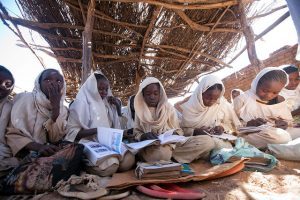Conference on Education for Children Affected by Emergencies
October 3rd 2018
RESOURCES FROM THE CONFERENCE
POWERPOINT SLIDES AND KEY REPORTS
Setting the scene
- DFID Education Policy 2018: Get Children Learning
- EU’s Policy on Education in Emergencies and Protracted Crises
- Equitable Access to Quality Education for Refugee Children and Youth – by Benoit D’Ansembourg, UNHCR
- Journal on Education in Emergencies – by Dana Burde, University of York and Editor-in-Chief for journal
- Global Challenges Research Fund – by Dr Kelsey Shanks, UNESCO Centre, University of Ulster
Theme 1: Political Economy
- The Political Economy of Education in Conflict Contexts – by Professor Mario Novelli, University of Sussex
- Political Economy Analysis (PEA) of Education in Nepal plus full report – by Alan Smith, University of Ulster and Tejendra Pherali, Institute of Education, University College London
- Why Education is not Helping the Poor: Findings from Uganda – by Simone Datzberger, Institute of Education, University College London
Theme 2: Gender and Inclusion
- Gender and Inclusion in Education in Emergencies: Issues, Challenges, Questions – by Dana Burde, New York University
- Inequalities in Knowledge Production: Gender Equality, Girls’ Schooling and Children Affected by Emergencies – Elaine Unterhalter, Institute of Education, University College London
- Education for Children Affected by Emergencies. Exploring Challenges and Promising Approaches for Children with Disability: What is the Evidence? – by Dr Maria Kett, Leonard Cheshire Research Centre
- Exploring Challenges and Promising Approaches for Children with Disabilities in Conflict and Crisis Situations – by Julia McGeown, Humanity & Inclusion
- Girls’ Education South Sudan (GESS) – by John Shotton, Cambridge Education
Theme 3: Forced Displacement
- Education and Forced Displacement: What We Don’t Know – by Dr Ruth Naylor, Education Development Trust
- Beyond Access and Enrolment: Understanding the Voices and Well-being of Syrian Refugee Students in Jordan – by Hiba Salem, REAL Centre, University of Cambridge
- The Challenging Policy Environment of Forced Displacement – by Dr Stephanie Bengtsson, IIEP-UNESCO and IIASA
- Higher Education in Contexts of Mass Displacement: Syrian Refugees in Lebanon – by Dr Mai Abu Moghli, Institute of Education, University College London
- Can’t Wait to Learn – by Kate Radford, War Child
- Accelerated Education in Uganda: New Ways of Working in EiE – by Charlotte Bergin, Save the Children
THEMATIC SUMMARIES
- Gender and inclusion in emergency contexts – by Dr Sharon Tao, Cambridge Education
- Forced displacement – by Dr Ruth Naylor, Education Development Trust
- Political economy of aid, policy and practice to education in crises – by Professor Mario Novelli, University of Sussex
VIDEOS
Summary videos
A donor’s perspective – with Emily Todd, Education Adviser, UK Department for International Development
An Academic’s perspective – with Dana Burde, University of York and Editor-in-Chief, Journal on Education in Emergencies
An academic’s perspective – with Professor Alan Smith, University of Ulster
Summary of Highlights
Full plenaries from live streaming
The morning panel session set the scene for delivering education in emergency contexts and panellists discussed policy and research priorities.
Chaired by Dr Tejendra Pherali, the speakers and their topics were:
– Emily Todd on Department for International Development (DFID) policy and programming
– Stijn De Lameillieure on EU policy and programming
– Mario Novelli (University of Sussex) on political economy
– Dana Burde (New York University) on gender and inclusion
– Benoit d’Ansembourg (UNHCR) on forced displacement
The afternoon panel session considered the key challenges and emerging issues for delivering education in emergency contexts from different actors’ perspectives.
Chaired by Ruth Naylor, the speakers were:
– John Shotton (Girls’ Education South Sudan programme) on the practitioner perspective
– Alan Smith (Ulster University) on the academic perspective
– Benoit d’Ansembourg (UNHCR) on the UN agencies’ perspective
– Emily Todd (DFID) and Stijn De Lameillieure (EU) on the donor perspective
– Charlotte Bergin (Save the Children) on the INGO perspective

